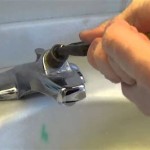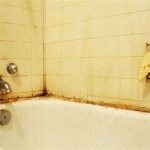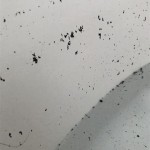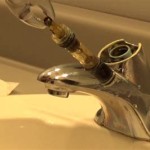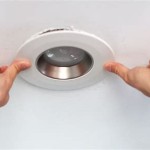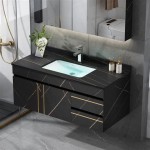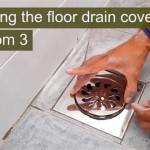How To Conceal Pipes In a Bathroom
Exposed plumbing can detract from the aesthetic appeal of a bathroom. Fortunately, several methods exist to conceal these pipes effectively, creating a cleaner, more polished look. Choosing the right method depends on the pipes' location, the bathroom's layout, and the desired level of accessibility for future maintenance.
1. Boxing In Pipes
Boxing in pipes is a common and relatively simple method for concealment. It involves constructing a frame around the exposed pipes using timber or metal studs, then covering the frame with a material that matches the bathroom's existing decor. Plywood is a popular choice due to its durability and ease of use, but moisture-resistant drywall is also an excellent option, especially for areas prone to humidity. The chosen covering material can then be tiled, painted, or wallpapered to seamlessly blend with the surrounding walls.
Building a box allows for easy access to the pipes via a removable panel. This is crucial for maintenance and repairs, preventing the need to demolish the entire structure. When constructing the box, ensure adequate space around the pipes for insulation and air circulation to prevent condensation and potential mold growth.
2. Using Furniture and Fixtures
Strategically placed furniture and fixtures can effectively hide exposed pipes. Vanities, cabinets, and shelving units can be positioned to conceal plumbing running along the wall. This method is particularly effective for pipes located beneath sinks or behind toilets. When selecting furniture for this purpose, ensure the pieces provide ample space for the pipes without compromising their functionality or aesthetic appeal.
This approach offers a practical and stylish solution, adding storage while simultaneously concealing unsightly plumbing. Ensure the furniture is securely installed and anchored to the wall, especially in earthquake-prone areas, to prevent accidental tipping and potential damage to the pipes.
3. Creating a False Wall
Constructing a false wall is a more involved method but offers a complete and seamless concealment solution. This involves building a stud wall a few inches in front of the existing wall containing the pipes. This creates a cavity within which the pipes are hidden. The new wall can then be finished to match the existing bathroom walls. This method is ideal for concealing large sections of exposed plumbing or when a complete redesign of the bathroom is underway.
While a false wall offers excellent concealment, it is essential to incorporate an access panel for future maintenance. Consider the placement of this panel carefully to ensure easy access without compromising the wall's aesthetics. The reduction in bathroom space due to the added wall thickness should also be considered during the planning phase.
4. Applying Pipe Cladding
Pipe cladding provides a quick and easy solution for covering exposed pipes without major construction. Cladding materials, available in various finishes like PVC, chrome, or brushed nickel, simply clip or adhere around the pipes, providing a clean and finished look. This option is particularly suitable for smaller sections of exposed pipework and is easy to install, even for DIY enthusiasts.
Pipe cladding is a cost-effective solution and offers easy access to the pipes for maintenance. Choose a cladding material that complements the existing bathroom fixtures and finishes for a cohesive look. Ensure the cladding is compatible with the pipe material and the bathroom environment.
5. Recessing Pipes into the Wall
Recessing pipes involves channeling into the wall and embedding the pipes within the wall cavity. This method offers the most seamless concealment, creating a completely flush finish. However, it's a more complex undertaking, often requiring professional plumbing and construction expertise. It is typically best suited for new constructions or major bathroom renovations.
While recessing pipes offers a superior aesthetic result, it's crucial to consider the structural integrity of the wall and local building codes. Access panels should be strategically placed for future maintenance, and proper insulation should be installed to prevent condensation issues.
6. Utilizing Decorative Screens or Panels
Decorative screens or panels can be used creatively to conceal exposed pipes while adding a decorative element to the bathroom. These can be freestanding or wall-mounted and are available in a range of materials and styles. This method is particularly suitable for concealing pipes located in less accessible areas or when a less permanent solution is desired.
When selecting screens or panels, consider the bathroom's overall style and ensure the chosen material is resistant to moisture and humidity. Ensure adequate ventilation around the pipes to prevent condensation buildup, which can lead to mold growth.
7. Repurposing Existing Features
Existing architectural features can sometimes be repurposed to conceal pipes. Recessed shelves, built-in niches, or even existing bulkheads can be modified to accommodate and hide plumbing. This approach can offer a unique and cost-effective solution, seamlessly integrating the pipes into the bathroom's design.
When repurposing existing features, assess the feasibility of the modification and ensure that the structural integrity of the feature is not compromised. Careful planning and execution are essential for a successful outcome.

How To Hide Plumbing In Your Bathroom Victoriaplum Com

An Interview With A Master Plumber And 3 Creative Ways To Hide Exposed Pipes Nir Plumbing

Creative Ways To Hide Exposed Plumbing Pipework Mayne Gas Heating

How To Cover Pipes In A Bathroom Dans Le Lakehouse

Boxing In Bathroom Pipework Guru

12 Best Hide Pipes Ideas Boxing In Small Toilet

Discover These 5 Methods To Hide Ugly Hdb Bathroom Kitchen Aircon Pipes Style Degree

Help Hiding Pipes In Downstairs Toilet Houzz

Cover And Tile Internal Soil Pipe When Fitting A Bathroom

How To Hide Pipes On A Small Floating Si Bunnings Work Community
Related Posts
